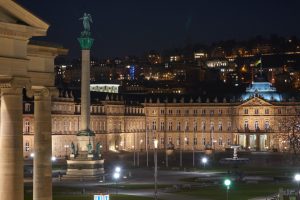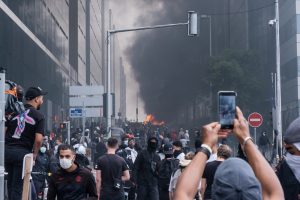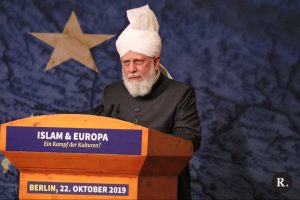a keynote address by
hazrat mirza masroor ahmadaba
khalifatul masih v
head of the worldwide ahmadiyya muslim community
The Worldwide Head of the Ahmadiyya Muslim Jama’at and Fifth Khalifah of the Promised Messiahas, Hazrat Mirza Masroor Ahmadaba delivered the keynote address at a special reception held at the Princess Court Reception Centre in Melbourne on the evening of 11th October 2013. The event was attended by more than 100 non-Ahmadi dignitaries and guests, including Major-General Paul McLachlan, Mayor of Frankston, Sandra Mayer, Anthony Byrne MP, Judith Graley MP and Ingra Peulich MP. His Holiness spoke on the global financial meltdown, the Arab Spring and Syrian Crisis, and why all of this is leading the world to a global catastrophe.

“Auzubillahi Minashaitanir Rajeem (I seek refuge with Allah from Satan the accursed)
Bismillahir-Rahmanir-Raheem (In the Name of Allah, the Gracious, the Merciful)
All distinguished guests – Assalamo Alaikum Wa Rahmatullahe Wa Barakatohu – peace and blessings of Allah be upon you all.
Before moving on to speak about those critical matters that the world stands in urgent need of, I would like to first of all take this opportunity to thank all of you for accepting our invitation and joining us here today. The fact that you are attending, irrespective of differences of religion and belief, is a testament to your open-mindedness and tolerant nature. Certainly, keeping in mind today’s materialistic world, the fact you have come to listen to the words of a religious person is proof of your enlightened minds and broad vision. Whilst from a worldly perspective it is a necessary moral courtesy for me to express my appreciation to you, even more importantly for me, it is essential to show my gratitude because it is my religious obligation.

© Edwardgerges | dreamstime.com
It is necessary to offer thanks in order to express gratitude to my Creator, because my master, the Holy Prophet Muhammadsa taught that a person who is not grateful to man cannot be grateful to God Almighty. Human beings are the greatest of all of God’s Creation and Allah the Almighty desires for mankind to respect and honour one another. This is why the Holy Qur’an, which is the sacred book for all Muslims and according to our beliefs is the final law-bearing book, is filled from cover to cover with commandments requiring mankind to fulfil the rights of one another. Certainly, to express due appreciation to another person is also a means to fulfil the rights owed to man and so my gratitude is not offered as a mere formality but actually emanates directly from my heart. Thus, I hope it is clear that my heartfelt appreciation is expressed not only in order to uphold high moral courtesies but in order to gain the pleasure of God Almighty.
With these brief words of introduction I would now like to discuss some issues of great concern, which are taking people far away from fulfilling the rights of each other in today’s world. Certainly, the critical state of today’s world is visible to all. The financial crisis that occurred a few years ago has completely shaken the world’s economy to its very core and the effects continue to be felt today. The cost of living and inflated prices have crippled the world and high unemployment is reaching record levels in certain countries. A number of European countries have become consumed by debt and even bankrupted. And this is not just a European problem. In fact, if we look at the United States, which is considered the most powerful country on earth, we find that some City Councils have been forced to declare their cities bankrupt as they have succumbed under the weight of mammoth debts worth billions of dollars. Even now the Federal Government has reached to the point where some of their offices have reached to the point of shut down. This is the state of the developed countries, whilst the economies of under-developed nations have always been in trouble. Compared to much of the world, Australia is to some extent stable. However, it has also been affected by the world’s financial crisis.
In today’s global age the world has come together like never before. Thus, the problems faced by one country have a knock-on effect on other nations, whilst successes in one country have a positive effect on others. Bearing this in mind, it cannot be said that any country is free from problems or immune to the global debt crisis. Furthermore, we find that the world’s financial crisis had not yet been resolved when another huge crisis took root in some countries. The crisis I am referring to particularly affected the Arab World and Muslim countries and came to be known as the ‘Arab Spring.’ In various countries, members of the public began to stand up against their rulers and governments. Huge protests and marches took place. Massacres and killings occurred, leading to thousands of people being murdered and still today thousands are continuing to lose their lives.
In some countries the rulers were able to suppress the protests and control the situation. However in others, the rulers faced very tough and even brutal consequences. Today, there are still some countries ravaged by war where the governments are continuing to face huge rebellions. The major powers have become involved in some of these conflicts by supplying weapons and money to the rebels in the name of assisting the people. However we have to question the result of such efforts because disorder and chaos continue to plague those nations. If we look at Libya as a case in point, we find that its governing officials, political analysts and media are all in agreement that tribal governments have now formed, and consequently, the central government is facing grave difficulties and is entirely weakened.

© Richard Harvey | dreamstime.com
During a recent visit to the United States, a journalist from a very famous newspaper asked me what I thought would be the long-term effects, or benefits, of the action that took place in such countries. I responded to her by stating that such action would not lead to peace either in Libya or in Egypt and nor would it lead to peace in the other affected nations. Indeed, when I met the journalist in May this year, I said that it was apparent that further bloodshed was impending in Egypt. However I did not expect it to occur so soon – yet just weeks later we all saw what transpired. Despite the violence and huge loss of life, it was quite apparent that on this occasion, the major powers ignored the severe force used by the new Government against certain segments of the public. Perhaps it was felt that it was necessary for a firm hand to be taken against such people, but the same end result could have been achieved with less force. The point I am making is that upon the onset of the same circumstances, in the name of establishing peace, the major powers took two entirely different approaches.
 Let us look at the example of another country. We all see that the situation in Syria continues to inflame and deteriorate before our eyes. Tens of thousands of people have died and are continuing to, whilst millions of Syrian citizens have been forced to flee their country to escape from the horrific situation. In the past few weeks it seems that an alliance of a few foreign countries is preparing to launch a military attack on Syria, but fortunately that situation has now been changed. It may well be the case that the Syrian rulers have carried out barbaric cruelties and injustices against their own people, however in seeking to achieve liberation, the rebel groups have themselves resorted to atrocities and cruelties. Innocent people who practice the same religion as the Syrian rulers or hold similar beliefs are being brutally murdered by those opposed to the government. Furthermore, on the pretext of helping the Syrian people, extremist groups from outside of Syria have come and joined the war. However, they are not fighting the government due to any human sympathies or compassion, but are seeking only to serve their own personal interests and gains.
Let us look at the example of another country. We all see that the situation in Syria continues to inflame and deteriorate before our eyes. Tens of thousands of people have died and are continuing to, whilst millions of Syrian citizens have been forced to flee their country to escape from the horrific situation. In the past few weeks it seems that an alliance of a few foreign countries is preparing to launch a military attack on Syria, but fortunately that situation has now been changed. It may well be the case that the Syrian rulers have carried out barbaric cruelties and injustices against their own people, however in seeking to achieve liberation, the rebel groups have themselves resorted to atrocities and cruelties. Innocent people who practice the same religion as the Syrian rulers or hold similar beliefs are being brutally murdered by those opposed to the government. Furthermore, on the pretext of helping the Syrian people, extremist groups from outside of Syria have come and joined the war. However, they are not fighting the government due to any human sympathies or compassion, but are seeking only to serve their own personal interests and gains.
Syria’s Government has claimed that it has not used any chemical weapons and rather it counter-claims that the rebel groups have used them. Outside agencies and inspectors have said they have evidence that chemical weapons have been used in Syria, but there does not seem to be any evidence to prove who has used them. However, now there are agencies present in Syria in order to destroy those weapons. We just pray that Allah helps them to succeed in their actions. God knows better what the truth is. The state of affairs in Syria has not only destroyed the peace and harmony of the region, but it is also destroying the peace of the entire world.

An important principle is that if any country commits cruelties or transgresses then first and foremost it is the duty of the neighbouring countries to step in and stop it. Some months ago a very wise suggestion was made by Israel’s President in relation to solving the Syrian crisis. He said that whilst the world’s major powers could provide Syria’s Arab neighbours with weapons or support, any action taken to try and establish peace should comprise only Arab forces. He said that if Western or non-Arab armies were to become directly involved then the peace of the world would further deteriorate.
Indeed, it is entirely accurate to suggest that an attack on Syria will be a means of provoking a Third World War. Two major opposing blocs would form – in fact they already have. We find that Russia and China and some of their allies are assisting and strongly supporting the Syrian Government. As I said, there is a serious risk of a world war and if we want to avoid it, then policy makers will have to make decisions with wisdom and with great consideration. What does Islam teach about establishing peace in such circumstances? Chapter 49, Verse 10 of the Holy Quran states:
“And if two parties of believers fight against each other, make peace between them; then if after that one of them transgresses against the other, fight the party that transgresses until it returns to the command of Allah. Then if it returns, make peace between them with equity, and act justly. Verily, Allah loves the just.”
Thus, this is the method which should have been used by Syria’s neighbouring countries to bring about peace between the government and the opposition groups. Unfortunately, this approach was not adopted from the outset and so thousands of people have been killed and hundreds of thousands have been left homeless.
In reality it was the task of the Organisation of Islamic Conference (OIC) to unite together and work towards peace in the region. However, rather than assume their duties the Muslim countries invited Western countries from outside the region to try and bring peace or perhaps the Western countries chose to invite themselves. What will the end result be? We are actually seeing the effects already beginning to appear, whereby two opposing blocs, each with differing sympathies, have formed. This division is causing us to reach the devastating precipice of a Third World War.
In the Qur’anic teaching that I presented it clearly stated that all attempts to establish peace amongst conflicting parties should be underpinned by true justice. Thus, it should not be that those tasked with establishing peace demand regime-change as a necessary pre-condition and that they then hand a particular group the keys to the government. If the party that has transgressed agrees to fulfil the rights of its citizens, and to treat them with fairness and equality, then those who have come as peace-makers should not set unjust or unwarranted conditions. They should not use more force than is proportionate or required because that will only lead to the situation spiralling further out of control. Islam teaches that when a third-party seeks to bring about reconciliation between two warring factions it should act impartially and with true justice. Certainly, the teachings I have presented are the true and beautiful teachings of Islam.
If Muslims were to follow this guidance we would not find a state of restlessness amongst the masses because, unrest is only triggered when a person’s due rights are seized or not fulfilled. Where decisions are made according to true principles of equity, and where the rights of all people are fulfilled, only peace and harmony will be found.
Regarding the fulfilment of the due rights of one another, there are many other profound teachings given by Islam. However, due to the shortage of time, it is not possible for me to cover them here today. Here I would like to point out that this golden principle given by the Quran is not only for Muslims, but in fact, it is a universal truth that in order to establish peace, justice must prevail. Unfortunately, when in the name of bringing peace major powers interfere in the matters of other countries, they do not uphold the requirements of justice to the necessary degree or in minute detail.

During a visit to the United States, I also addressed their senior politicians and policy makers. I clearly said to them that any act or policy they undertake to try and develop peace will never be successful until all personal interests are set aside and until the requirements of justice are upheld in an entirely selfless manner. It is for this very reason that at another place, the Holy Qur’an has stated that you must always remain just, even if it means that you have to testify against yourself or your loved ones. And so the point I make is that it is the duty of major powers and the United Nations to strive to bring about peace and reconciliation through equity and fairness. Where there is a dispute between two parties or nations, all efforts should focus on drawing their attention to fulfilling each other’s rights. Where a peace deal or agreement is reached, then neither the major powers nor the United Nations should seek to further their own political objectives from any nation or group.
If we cast a glance over history, we find that the League of Nations fundamentally failed in its objectives because it was not acting upon the aforementioned principles. Its chronic failure to establish justice led to unparalleled devastation when the Second World War occurred. Similarly, if we fast forward to today, we find that the United Nations is not fulfilling its role as it ought to and often remains silent on many issues. Further, the leaders of the major powers openly challenge its authority and state that they do not need the permission of the United Nations and that it is “their right” to act as they please. They say that if they wish to attack Syria, they are free to do so. They should realise that by completely discarding principles of justice on the pretext of fulfilling the rights of others and whilst sitting thousands of miles away, it will undoubtedly only lead to strife and disorder. Through such acts all people will be affected.
The world has come together like a global village and so such disorder will not be contained, but will encompass and consume the entire world. This is the reason why I say, time and time again, that we should make every possible effort to save the world from a Third World War. If such a war was to occur, then there would not only be a threat of chemical weapons, but rather there is a very strong likelihood that nuclear weapons would also be used. The horrific effects of atomic warfare are indescribable and would be felt for generations to come.
And so I would request all of the influential figures in this country, be they politicians, dignitaries or intellectuals, to recognise that because Australia is also one of the major countries of the world, they too should play their respective roles in making every effort to transform this state of disorder and injustice into a state of peace and harmony.
May it be that your future generations come to thank and pray for you, rather than curse and abuse you, for the legacy left behind.
At the end I would like to once again thank all of you for taking the time and effort to attend this function and to listen to what I have said.
May Allah bless you. Thank you very much.”




Add Comment